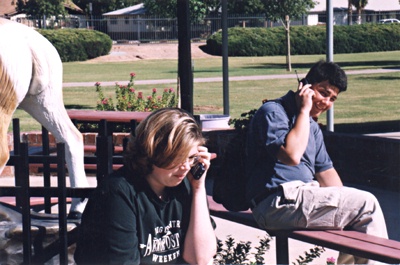All Nonfiction
- Bullying
- Books
- Academic
- Author Interviews
- Celebrity interviews
- College Articles
- College Essays
- Educator of the Year
- Heroes
- Interviews
- Memoir
- Personal Experience
- Sports
- Travel & Culture
All Opinions
- Bullying
- Current Events / Politics
- Discrimination
- Drugs / Alcohol / Smoking
- Entertainment / Celebrities
- Environment
- Love / Relationships
- Movies / Music / TV
- Pop Culture / Trends
- School / College
- Social Issues / Civics
- Spirituality / Religion
- Sports / Hobbies
All Hot Topics
- Bullying
- Community Service
- Environment
- Health
- Letters to the Editor
- Pride & Prejudice
- What Matters
- Back
Summer Guide
- Program Links
- Program Reviews
- Back
College Guide
- College Links
- College Reviews
- College Essays
- College Articles
- Back
The Age of Technological "Communication"
“The great myth of our times is that technology is communication.” –Libby Larson
The age of technological communication
Does technology really aid human communication, or is it a silent killer? Sure – instant messaging and social media allow us to keep in touch with friends who live far, and sure lists of “friends” and followers on Facebook and Instagram may make us feel more connected, but are we really? In this day and age, the majority of teenagers and adults in the U.S. use technology (mobile phones in specific) to interact and communicate with the online world on a daily basis. However as Larson hints at, technology is truly the furthest thing from communication; it would be better defined as a barrier to human interaction.
In my experiences walking through the hallways of Ramapo in between classes, I have noticed one thing: Technology may be a tool for communication, but it seems to distract from face-to-face human interaction. Most students at our school fall into two categories: On one hand, there are those who talk to a friend- phone in their hand, or bag- or nowhere to be seen, enjoying human interaction. Then, there are those who walk silently, not speaking aloud, but through the lit screen of their Android, iPhone, or other cellular device. I no longer see smiles and conversation, and if I do- they are followed by quick glances down at cellphones and iMessage. It’s as if technology is an addiction that society cannot seem to break. In fact, over 58% of those with a smartphone admit that they do not go over an hour without checking their phone, with the exception of the time that they are sleeping ("Mobile Mindset Study."). In addition, ninety-one percent of all adults have their phone within arm’s reach every hour of every day ("Mobile Mindset Study."). The constant “connection” we have with our mobile phones is leaving us disconnected from each other. We miss quite a bit when looking down at a smartphone rather than up at the world.
A smart phone is just another gadget that aids in wasting time. The average 21-year-old college student has spent 10,000 hours on a mobile phone in their life so far. (“23 Cool Tech Facts.”) That’s about 417 days, over a year- and that’s only so far. If that statistic didn’t surprise you, there are 6.8 billion people in the world and while 4 billon use smartphones- only 3.5 billion people use toothbrushes (“23 Cool Tech Facts.”).
One question that tends to pop into the human mind from time to time is: Do we control technology, or does it control us? Why is it that a material object is able to control us? Are we weak, or is the invention too strong? As Norwegian political figure Christian Lous Lange insightfully said before technology had even evolved to the level it as at today; “Technology is a useful servant but a dangerous master”. Technology is useful for communicating over long distances, it is useful in emergency situations- overall, and it proves to be extremely useful, when we are in control. But when the phone rings in the middle of a family dinner, why is it that we feel the need to check whose calling? At any restaurant, why does it seem as if half of the customers are typing a message rather than talking to those who are across the table. Our generation has started to give in to this addiction, but there is still a chance to prevent further damage. If we put down the cell phones, close our laptops, and focus on face to interaction—we can reverse the effects of the invention of the iPhone.
Works Cited
"Mobile Mindset Study." Lookout. Lookout Inc., Web. 26 Mar. 2015.
“23 Cool Tech Facts.” Website Magazine. 18 May 2014. Web. 26 Mar. 2015.

Similar Articles
JOIN THE DISCUSSION
This article has 0 comments.
